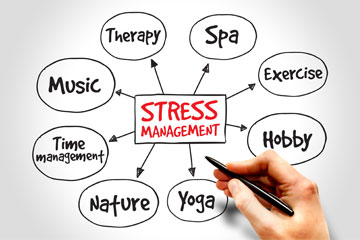Stress has become a part of most people’s lives. Stress usually occurs and builds up due to factors such as illness, work-related and financial problems, family issues, and so on. Stress leads to anxiety, and in the long run, can cause depression and personality disorders which eventually lead to heart disease, high blood pressure and other chronic health conditions.
Stress refers to your body’s reaction to challenges and demands, and can be positive or negative. Fortunately, there are many ways to combat negative stress. Here are some simple, short-term stress relief strategies:
- Meditate: This is a short term but long lasting stress buster. There are several forms of meditation and each form has different benefits. Meditation can produce a state of relaxation, provide a sense of calm, peace and balance, and improve your emotional and overall health.
- Guided Imagery: This refers to taking a short vacation in your mind. Imagine you are in a pleasant location, having a great time with your family, or spending time on beach, etc. Guided imagery can be done with a recording where you listen to someone walk you through a peaceful scene. Once you know how to do it yourself, you can practice guided imagery on your own. You can also close your eyes and imagine yourself taking a walk through a peaceful scene. Consider all the sensory experiences you’d engage in and allow yourself to feel as though you’re really there.
- Progressive Muscle Relaxation: Progressive muscle relaxation means relaxing all the muscles in your body, group by group. You can begin with a few deep breaths and then move on to practicing tightening and relaxing each muscle group. Start with your forehead and then slowly move on to the toes. With time and practice, you will learn to identify tension and tightness in your muscles and be able to relax more easily.
- Breathing Exercises: Changing the way you breathe can make a huge impact on reducing your stress level. Breathing the right way can help calm down your body. Here are a few simple breathing exercises:
- Breathe in through your nose and watch your belly fill with air. Count slowly to three as you inhale. Hold for one second and then slowly breathe out through your nose as you count to three again.
- Breathe through your nose and imagine that you are exhaling out stress.
- Go for a Walk: Going for a walk or jog can help relieve stress. It also helps to enjoy the beautiful scenery, change the frame of mind, and reduce stress. Walking is an effective way to rejuvenate yourself.
Long term stress relief strategies - Maintain a Balanced Diet: A poor diet and emotional eating can lead to stress. Emotional eating means eating high fat high-sugar foods that can provide a temporary sense of relief from stress. Unhealthy food like cookies and potato chips can cause a spike in blood sugar. When your blood sugar crashes, you might experience more stress and anxiety. Maintaining a proper balanced diet will help combat stress. Foods like eggs, avocados, and walnuts help with mood regulation and energy balance.
- Practice Yoga: Yoga is a combination of physical movement, meditation, light exercise and controlled breathing and all of these activities helps in reducing stress. To benefit from yoga, you must do it consistently for a long period of time.
- Show Gratitude: Recognize and understand all things to be grateful for. Be grateful for all the good things you have in life. Make a list of all the things you are grateful for at the end of the day – make this a regular habit.
- Exercise Regularly: Physical activity is one of the best ways to fight stress. There are many forms of physical activities like kick boxing, badminton, working out in gym, hiking, kayaking, and even working out at your home. All these activities can help relieve or minimize stress.
- Talk to Yourself: Talking to yourself is one of the best practices to minimize stress. Avoid harsh self-criticism, self-doubt, and catastrophic predictions. Similarly, things like “I don’t have time for this,” and “I can’t stand this” can also stress you out easily. Talking positively to yourself can help you develop a healthier outlook, be more optimistic, and manage your emotions and stress better.
Quick stress relief strategies
- Hug a Loved One: Physical touch like hugging and cuddling can help relieve stress. When you hug someone, a hormone known as oxytocin is released which is associated with higher levels of happiness and lower levels of stress. It helps to relax and calm you.
- Create Artwork: Be creative and do painting or drawing or any craft work that will make you happy. Today there are adult colouring books that help relieve stress. Studies have found that stress and anxiety level can be reduced with colouring complex geometric patterns, making it a perfect outlet for stress reduction.
- Try Aromatherapy: Aromatherapy has advantages to fight stress and make you feel more energized and relaxed. New research suggests certain scents can alter brain wave activity and decrease stress hormones in the body. Scented candles, diffusers, or body products can infuse aromatherapy into your day.
Stress is a normal human response, but too much stress can be dangerous, both mentally and physically. The above-mentioned strategies can help you keep stress at bay.
